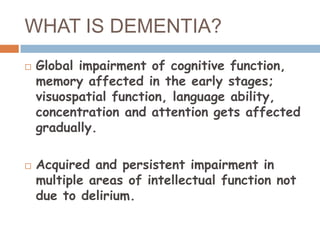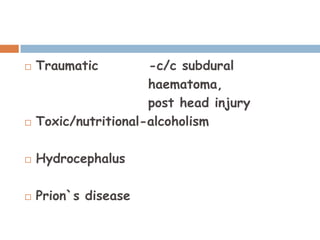Dementia
- 1. DEMENTIA
- 2. 75 year old Retd school teacher. Memory loss- lost purse, searches for objects - 2 months. Mental stressor – quarrel with son - 2 months.
- 3. AMNESIA Amnesia is a deficit of memory, i.e., the storage or retrieval of consciously processed information. Focal lesions in limbic structures. Anterograde n retrograde amnesia
- 4. WHAT IS DEMENTIA? Global impairment of cognitive function, memory affected in the early stages; visuospatial function, language ability, concentration and attention gets affected gradually. Acquired and persistent impairment in multiple areas of intellectual function not due to delirium.
- 5. Loss of mental functions. Usually above 65 yrs Most common cause- ALZHIEMER`S DISEASE and CEREBRAL VASCULAR DIEASE.
- 6. DSM 1V DEFINITION Multiple cognitive deficits memory impairment Aphasia, Apraxia, Agnosia, Disturbance in executive functioning.
- 7. CAUSES OF DEMENTIA Vascular -diffuse small vessel disease Deg/inherited - Alzheimer`s disease Neoplastic - secondary deposits Inflammatory -multiple sclerosis Infective
- 8. Traumatic -c/c subdural haematoma, post head injury Toxic/nutritional-alcoholism Hydrocephalus Prion`s disease
- 9. REVERSIBLE VS IRREVERSIBLE Reversible – can be corrected infection,SDH,B12 def hypothyroidism,neoplasm hydrocephalus Irreversible –Alzhiemer`s disease Prion`s disease SSPE
- 10. CORTICAL VS SUBCORTICAL CORTICAL (AD) SUBCORTICAL (PD) Normal cognitive processing, Slowing, but correct wrong answers Severe amnesia, recall n Better recognition, improved by recognition affected clues Executive abilities preserved Disproportionately affected Aphasia prominent Normal with dysarthria n less word output Personality intact until late Apathetic n inert Mood normal, sometimes elated Depression
- 11. DELIRIUM Disturbance in the level of consciousness. Acute disorder of cognition characterized by fluctuating disturbance in attention. Often reversible Develops over a short period of time and tends to fluctuate during the course of the day.
- 12. DELIRIUM DEMENTIA Onset - Acute/subacute insidious Course- Fluctuating stable Duration - Hrs to days Months to yrs Consciousness -Clouded Clear Attention - Impaired normal
- 13. Thank you













